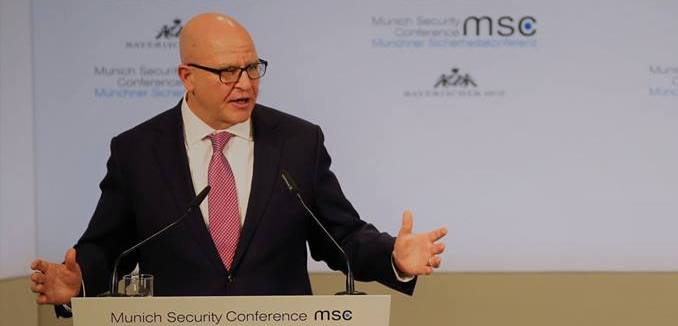National Security Advisor H. R. McMaster called on the international community to stop funding Iran’s Islamic Revolutionary Guard Corps (IRGC), saying that it was time to “cut off funding” to the group, which has played a “central role” in Iran’s becoming the world’s leading state sponsor of terror, during his remarks at the Munich Security Conference, Defense News reported Saturday.
McMaster had noted that Iran’s principal civilian airline, Mahan Air, which is affiliated with the IRGC is allowed to land in Munich, even though Iran uses it to transport personnel and weapons to aid its allies, including Bashar al-Assad in Syria.
In October of last year, when President Donald Trump announced that he would not certify that Iran was in compliance with the nuclear deal, he said that he planned to target the IRGC with further sanctions. When Treasury Secretary Steven Mnuchin subsequently announced the sanctions, he explained that “the IRGC has played a central role to Iran becoming the world’s foremost state sponsor of terror.” He also warned “the private sector to recognize that the IRGC permeates much of the Iranian economy, and those who transact with IRGC-controlled companies do so at great risk.”
“What Iran is actually doing is applying the Hezbollah model to the greater Middle East,” McMaster said. “They want the Arab world perpetually weak, and [they want] weak governments in power that are dependent on Iran for support, while they grow terrorist organizations, militias, illegal arms groups outside that government’s control that can turn against government if that government acts against Iranian interests.”
In addition to its defense of Assad, McMaster noted that Iran was coordinating the Shiite militias in Iraq, or Popular Mobilization Forces (PMF), and that its proxies were getting stronger as Iran provided them with more advanced weaponry.
“When you invest in Iran, you’re investing in the IRGC. You might as well cut the Islamic Revolutionary Guard Corps a check and say, ‘please use this to commit more murder across the Middle East,’” McMaster said, addressing the threat of the IRGC. “And when we look at the biggest trading partners with Iran, we of course see Russia, we see China. But we also see Japan, South Korea and Germany. It’s time to focus business intelligence efforts to figure out who we are really doing business with, and cut off funding.”
McMaster also called on the world “to address serious flaws in the Iran deal and counter Iran’s destabilizing activities, including its development and proliferation of missiles, and its support for terrorist proxies and militias that fuel destructive conflicts across the greater Middle East.”
A recent article in The New York Times explained how Iran “embedded” itself in Syria, raising the specter of a possible two-front war with Israel in the future.
[Photo: U.S. Embassy Berlin / Facebook]




